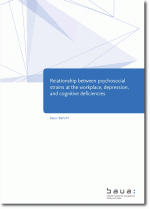Relationship between psychosocial strains at the workplace, depression, and cognitive deficiencies
The subject of mental disorders and work is of high priority for occupational safety and health, in particular where job stresses lead to depression and impairment of work ability. Factors potentially contributing to depression and work ability impairment include psychosocial work characteristics (PWC), burnout, cognitive deficits, and aging. Referencing the Job-Demand Resources (JD-R) model, burnout is viewed as mediating the association between PWC and depressive symptoms, but the mediating relationship between PWC and work ability remains to be tested. Further, cognitive deficits may be a marker for chronic problems with burnout, depression and work ability. The current project studied how these factors relate to one another, based on a sample of 402 working nurses in a large private health system in the United States. Participants completed baseline assessments of PWC, burnout, depressive symptoms, cognitive performance, and work ability. In addition, follow-up assessments of these factors (except cognitive performance) were conducted over 12 months. Results confirmed the JD-R model in finding that burnout mediated the association between PWC and chronic depressive symptoms, but the reverse was not found for depressive symptoms mediating the association between PWC and chronic burnout. In addition, higher burnout was associated with worse work ability over 12 months, including effects on both psychological and physical dimensions, whereas depressive symptoms affected psychological work ability only. Cognitive performance was found to have an inconsistent association to burnout, depressive symptoms, and work ability, though slowing of reaction time was found in association to both cross-sectional and longitudinal measures of burnout. Aging was found to be generally associated with lower burnout and depressive symptoms, but older workers were vulnerable to greater work ability impairment with increasing burnout symptoms. These findings highlight that burnout is conceptually distinct from depression, is a major driver of health impairment in the domains of depressive symptoms and work ability, and may also be associated with cognitive slowing. These findings recommend more research on interventions to prevent the conversion of acute job strain from PWC to chronic burnout, which may have downstream benefits for reducing depressive symptoms and improving work ability. Increased monitoring of workplace psychosocial strains is also recommended. This study was part of a collaborative project with the Federal Institute for Occupational Safety and Health (BAuA), which included use of measures common to studies conducted by the BAuA in Germany, thereby providing needed validation in a U.S. occupational sample. These two countries have robust business relationships that could be further strengthened with shared objectives for occupational health. The current collaborative project provides an example of research that can benefit the health of workers of both countries.
Bibliographic information
Title: Relationship between psychosocial strains at the workplace, depression, and cognitive deficiencies.
1. edition. Dortmund: Bundesanstalt für Arbeitsschutz und Arbeitsmedizin, 2018. pages: 96, Project number: F 2318, PDF file, DOI: 10.21934/baua:bericht20180926


